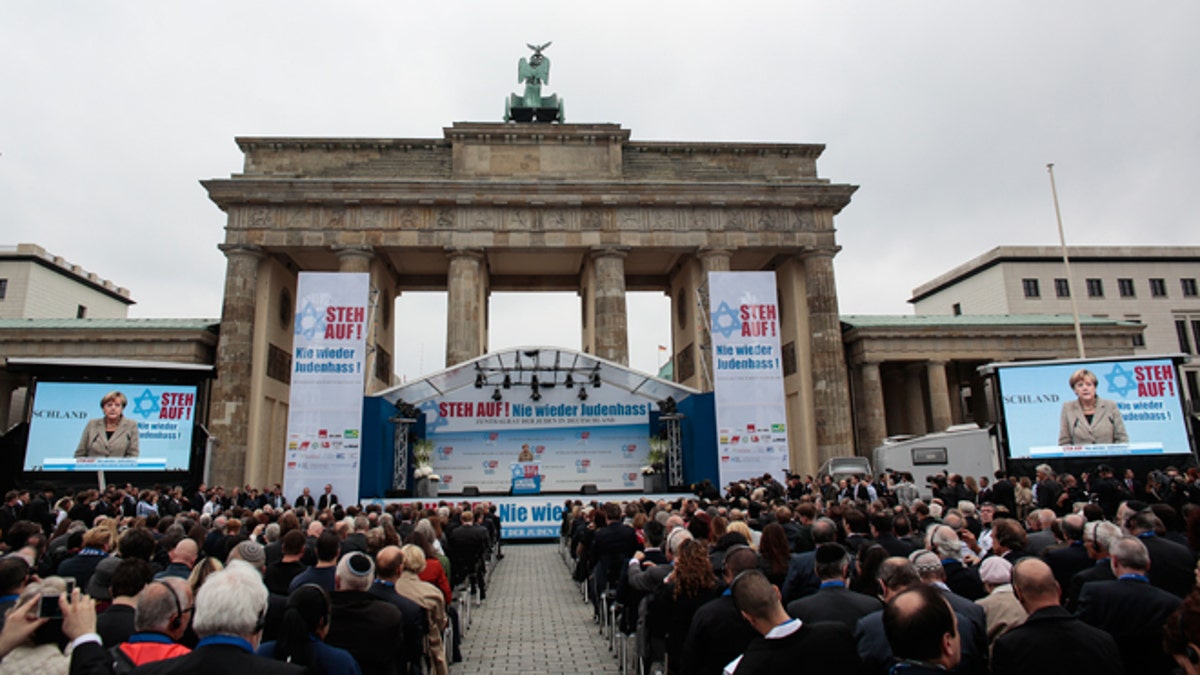
Sept. 14, 2014: German Chancellor Angela Merkel delivers her speech at a rally against anti-Semitism near the Brandenburg Gate in Berlin. Thousands of protesters attended the public rally organized by Germany’s Jewish community at the capital’s Brandenburg Gate after tensions over the Gaza conflict spilled over into demonstrations in Europe that saw anti-Jewish slogans and violence. The slogan reads: Stand Up! - Jew hatred - never again!', and the name of the organizer: Central Council of Jews in Germany. (AP Photo/Markus Schreiber)
The embers of anti-Semitism still burn in Germany. This was clear during summer demonstrations against the war in Gaza. Anti-Israeli protesters crossed a line when they engaged in hate speech and violence against Jews, breaking all German taboos and laws against such speech. Police reaction was weak.
These expressions of virulent anti-Semitism and the government’s failure to effectively counter them show that Germany must rethink its current policies and face the haters head-on.
At a rally on September 14 that drew thousands of supporters to the Brandenburg Gate in Berlin on September 14 by Federal Chancellor Angela Merkel pledged her support to Germany’s more than 100,000 Jews and sharply condemned the animosity toward Jews that’s taking place in her country and throughout Europe.
[pullquote]
“I emphatically rebuke all anti-Semitic statements and attacks,” Merkel said, “not the least of which those that have recently emerged from pro-Palestinian demonstrations that are putatively based on critique of the politics of Israel, but are in fact solely and exclusively expressions of hate against Jews.”
These anti-Semitic incidents have been numerous and violent in tone.
“Jews to the gas!” was a chant of those parading through the streets of German cities this summer. “Jews are child murderers!” was another. The demonstrators were mainly Islamists.
The verbal abuse also included physical attacks.
In Essen, Andre L. Ufferfilge was spat upon and called a “Jew pig” because he wore a yarmulke. A Molotov cocktail was thrown at a new synagogue in Wuppertal in North Rhine Westphalia, the German state with the largest Muslim population, where extremists have started a Shariah patrol to impose a dress code for women and to outlaw smoking and alcohol.
The violent anti-Semitic attacks in Germany, while fewer than those in France, are shocking in a country that is held to a higher standard because it bears responsibility for the Holocaust.
The hatred is further inflamed by the influence of social media, where anti-Semitic images and hashtags abound, including #HitlerWasRight on Twitter.
When Merkel said in October 2010 that multiculturalism doesn’t work, she highlighted her country’s failure to integrate its 4 million Muslims into German society. Many feel marginalized and are drawn to radical Islam with its hatred of Jews.
But Muslims, right-wing extremists, and the far left are not the only purveyors of anti-Semitism.
A January 2010 report commissioned by the Bundestag, Germany’s parliament, found that 20 percent of Germans harbored anti-Semitic sentiments. The report called for major educational changes to deal with racism. No action has been taken.
“We have lost three valuable years in which there has been almost no funds for research or programs to fight anti-Semitism,” said Deirdre Berger, director of the American Jewish Committee in Berlin.
Anti-Semitic attitudes go back for centuries; they are burrowed into the minds of educated Germans. Now the taboos about expressing anti-Semitic slurs in public discourse are disappearing.
A recent study by Professor Monika Schwarz-Friesel of the Technical University of Berlin found that the majority of writers of anti-Semitic hate mail are well-educated professionals. And they readily identify themselves, while 20 years ago they would have concealed their identities.
“We want Jews to feel safe in Germany,” Merkel said in her speech on Sunday. “Jewish life belongs to us. It is part of our identity.”
She called it an outrageous and unacceptable scandal that Jews are being threatened and abused in Germany.
While no one doubts Merkel’s sincerity, all signs point to the need for more effective government action to address the country’s simmering anti-Semitism.
Otherwise, it will become increasingly less safe to be a Jew in Germany.
